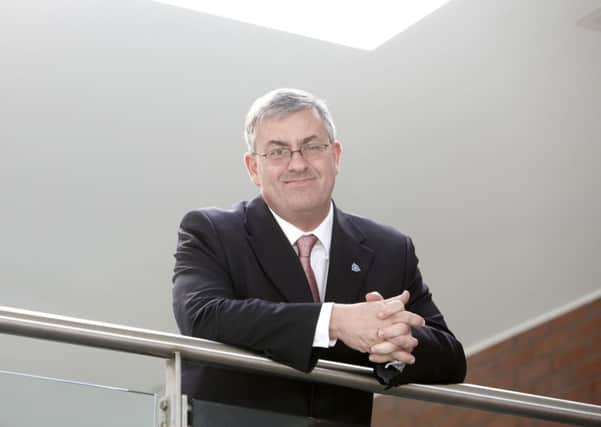Region at forefront of world’s energy challenge


Energy use lies at the centre of the global climate change debate while fuel security plays a growing role in our politics and personal finances.
Access to clean, reliable energy “on demand” is likely to determine whether advanced economies can sustain significant economic growth in the 21st Century, and may underpin fundamental changes to how we organise our societies in the longer term.
Advertisement
Hide AdAdvertisement
Hide AdYorkshire is a key centre for innovation in renewable energy generation: facilities such as the Dogger Bank wind farm and Drax biomass fuelled power station lead technological change in their fields.
In March, Siemens announced a £310 million deal to develop a wind turbine blade plant on the North bank of the Humber, one of the Government’s 16 centres for offshore renewable engineering. The development will create more than 1,000 local jobs.
But unless scientists can find a way of efficiently storing energy when it is generated in excess (i.e. on very windy or sunny days) we will never be free from fossil fuels. “Storing energy will become increasingly important in the move towards a low carbon economy,” said Greg Barker, Minister for Energy and Climate Change, as he announced over £8 million of funding in February this year for innovation in energy storage.
To help Britain prepare for the move, former Minister for Universities and Science David Willetts made energy storage a national priority. “UK researchers are leading the way in alternative energy storage technologies,” he explains in his ‘Great Eight Technologies’ report. “We are a well recognised global leader.”
Researchers in Yorkshire are vital to that leadership.
Advertisement
Hide AdAdvertisement
Hide AdAt the University of Leeds, the Energy Leeds hub makes energy research easily available to industry and Government. The research ranges from characterising the combustion of biofuels to economic analyses of how society may adopt new technologies. The work could be transformative.
Professor Dongsheng Wen advises two pioneering UK firms on cryogenic’ energy storage, which uses very cold fluids to store energy on the energy grid or in cars. Another group at Leeds, led by Professor Ian Ward, has developed a novel polymer gel that will make safer and cheaper lithium batteries—and may lead to exciting new products such as bendable mobile phones.
Meanwhile the University of Sheffield is looking at the other end of car battery life cycle. Researchers want to know if old batteries from electric cars have enough life left to power domestic appliances. Cheap batteries could effectively turn millions of appliances into a national, distributed energy store which can charge up during excess generation and run on battery power when demand peaks.
Some scientists are developing batteries on an even grander scale. Sheffield also leads a major project to connect a massive 2MW battery – the size of an articulated lorry – to the grid. It will be the first battery of its kind to be used in this way in the UK.
Advertisement
Hide AdAdvertisement
Hide AdAlongside Yorkshire’s expertise in energy storage research, our universities are also working to make renewable generation more efficient – another way to ensure renewables deliver all the energy we need.
Scientists at York University, for example, are collaborating internationally to boost the efficiency of photovoltaic (PV) panels. Dr Thomas Krauss has helped to enhance the thin films that make up PV panels by introducing a novel structure – called a quasi-random structure – to the film material. The panels can now capture more light and so generate more electricity. For Yorkshire and the rest of the north, this technology could finally make solar generation a viable option.
York University is trying to give biofuels a big boost too. Researchers in the Department of Chemistry have discovered a family of enzymes that degrade hard-to-digest biomass into sugars that can then be fermented to useful bioethanol. Professor Paul Walton says: “Bioethanol producers now have a powerful tool to help them generate biofuel from sustainable sources, such as waste plant matter.”
Whether it is extracting energy from waste, balancing power supply and demand or weaning ourselves away from oil, there are clear economic and environmental drivers for this research. Minister Greg Parker says that storing energy, for example, “has the potential to save the energy system £4 billion by 2050,” not to mention the benefits of lower carbon emissions.
Advertisement
Hide AdAdvertisement
Hide AdAs a host to big players in renewables, it is good to see universities in Yorkshire developing solutions which will sustain these businesses and drive UK leadership in this sector.
--
The Yorkshire Post has teamed up with the region’s top academic institutions to shine a light on Yorkshire’s strengths in emerging technologies.
Our monthly series will look at the areas identified in the Government’s ‘Great Eight’ strategy (although a ninth has since been added to the list).
They are authored by Julian White, chief executive of the White Rose University Consortium, who is drawing upon the world-leading expertise at the universities of Leeds, Sheffield and York.
The consortium is seen as a key vehicle for promoting and exploiting the Great Eight.